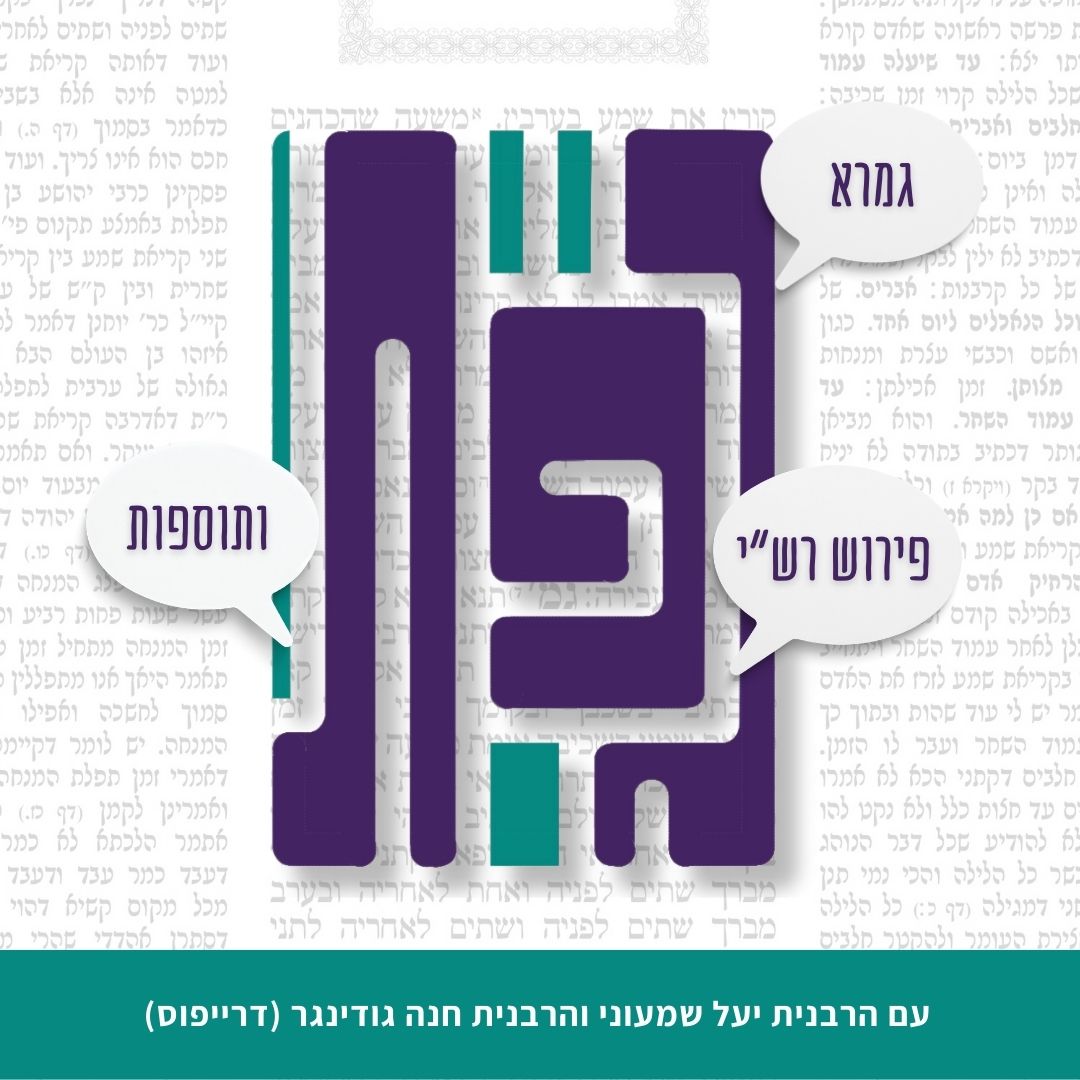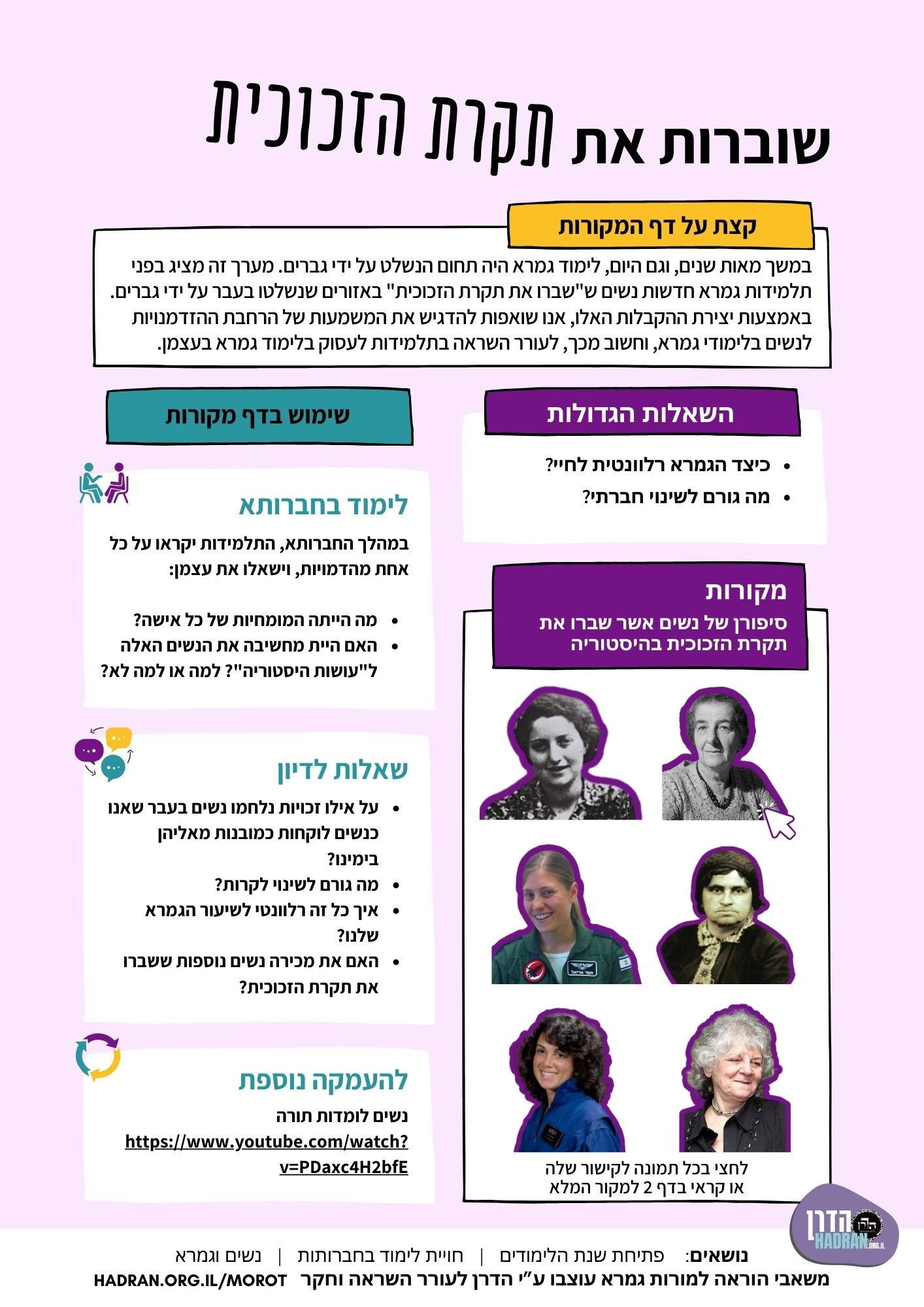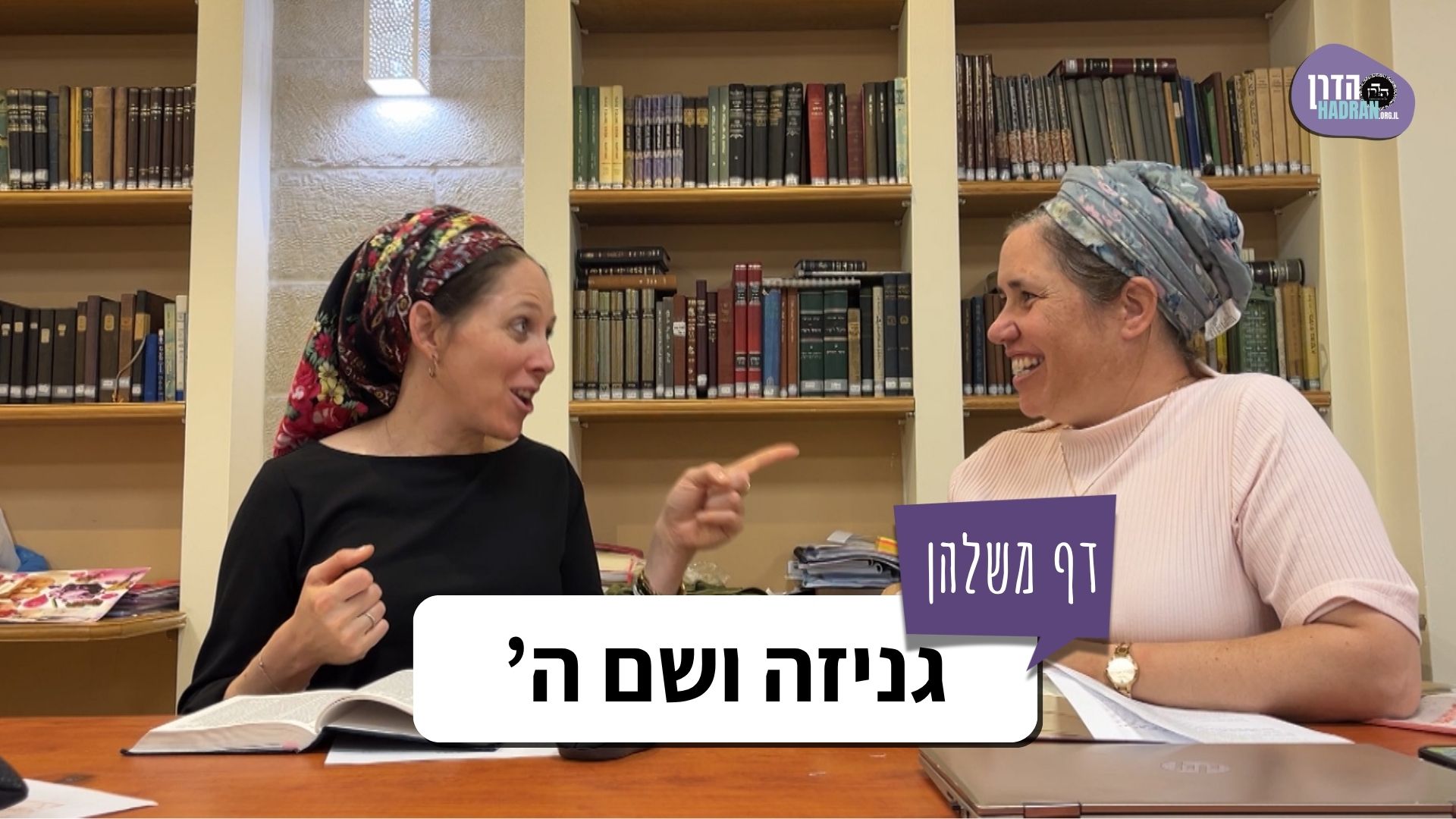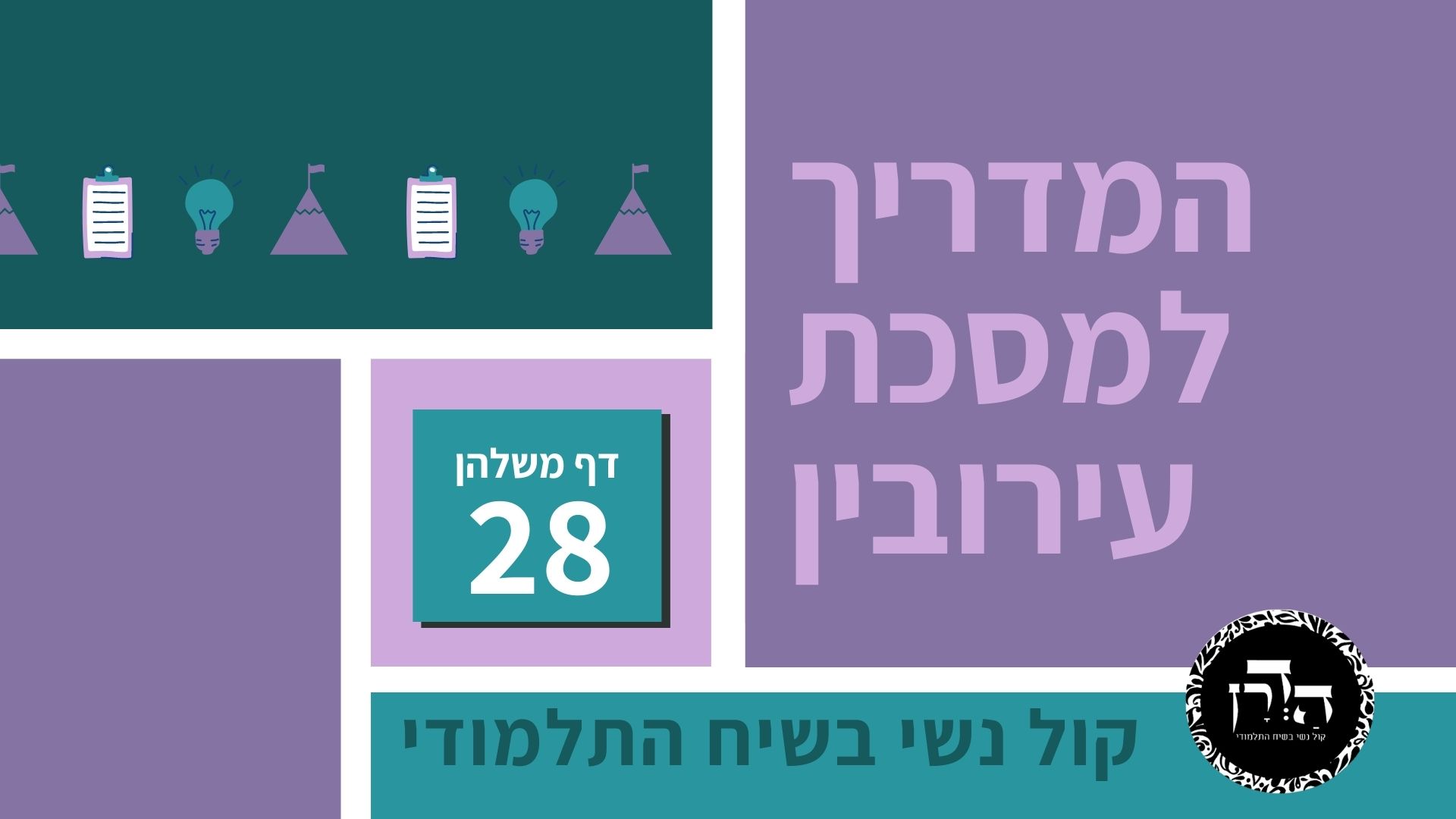מה הדין לגבי כתמים של נשים – האם מטמאים למפרע? האם יש הבדל בין דין כתמים לנשים שיש להן וסת לבין נשים כמו מעוברת ומניקה שנחשבות מסולקות דמים? האם שתי הבדיקות לפני ואחרי תשמיש נחשבים כבדיקה? למה המשנה הזכירה שהאשה ישבה על מיטה? מה אפשר ללמוד להלכה מכך לגבי טומאת משכב ומושב למפרע? איזה סוג של דברים נחשבים "שיש בהן דעת להישאל”?

כלים
הלימוד החודש מוקדש לרפואת פיליס הכט, גיטל פעשא בת מאשה רחל על ידי חברותיה הרבות שאוהבות ומעריכות אותה.
כלים
העמקה
רוצה להבין מה באמת קורה מתחת לפני השטח של הסוגיה?
שיעורים, פודקאסטים והרחבות של מיטב המורות שלנו יפתחו לך עוד זוויות וכיווני חשיבה.
חדשה בלימוד הגמרא?
זה הדף הראשון שלך? איזו התרגשות עצומה! יש לנו בדיוק את התכנים והכלים שיעזרו לך לעשות את הצעדים הראשונים ללמידה בקצב וברמה שלך, כך תוכלי להרגיש בנוח גם בתוך הסוגיות המורכבות ומאתגרות.
פסיפס הלומדות שלנו
גלי את קהילת הלומדות שלנו, מגוון נשים, רקעים וסיפורים. כולן חלק מתנועה ומסע מרגש ועוצמתי.
נדה ה
וּבָרַיְיתָא דִּבְרֵי הַכֹּל.
And as for the ruling of the baraita, that a woman who discovers menstrual blood not at her fixed time for menstruation is impure retroactively, this is a halakha with which everyone agrees.
וְלוֹקְמָא אִיפְּכָא!
The Gemara raises a difficulty: But let us interpret the mishna in the opposite manner. Why interpret the mishna in accordance with the opinion of Rabbi Dosa and the baraita in accordance with everyone, when we can give precedence to the mishna, which is more authoritative, by interpreting it in accordance with all opinions, as was first explained, and the baraita only in accordance with the opinion of the Rabbis.
כֵּיוָן דְּאִיכָּא לְאוֹקוֹמֵי לְקוּלָּא וּלְחוּמְרָא — לְחוּמְרָא מוֹקְמִינַן.
The Gemara answers: Since there is a way to interpret it as a leniency, i.e., that all agree that blood discovered at the fixed time of menstruation renders items impure only from that point onward, and it can also be interpreted in a manner that leads to a stringency, i.e., everyone agrees that blood discovered not at her fixed time for menstruation causes retroactive impurity, and furthermore the Rabbis hold that this is the halakha even when blood is discovered at her fixed time of menstruation, we interpret it the way that leads to a stringency.
קָתָנֵי: שֶׁאִם תִּרְאֶה שֶׁלֹּא בִּשְׁעַת וִסְתָּהּ מְטַמְּאָה מֵעֵת לְעֵת. טַעְמָא דְּאִשָּׁה שֶׁיֵּשׁ לָהּ וֶסֶת הוּא, דִּפְלִיגִי רַבָּנַן בֵּין כִּתְמָהּ לִרְאִיָּיתָהּ,
§ It is taught in the baraita: If a woman who has a fixed menstrual cycle finds a blood stain, her blood stain is retroactively impure. The reason is that if she sees a flow of menstrual blood not at the fixed time of her menstrual cycle, it renders her ritually impure retroactively for a twenty-four-hour period. The Gemara analyzes this statement: The reason for this ruling is that she is a woman who has a fixed menstrual cycle; therefore, the Rabbis distinguish between her blood stain, which causes retroactive impurity like a sighting not at her fixed time, and her sighting of her menstrual flow at its fixed time, which does not cause retroactive impurity.
הָא שְׁאָר נָשִׁים שֶׁאָמְרוּ חֲכָמִים דַּיָּין שְׁעָתָן — כִּתְמָן כִּרְאִיָּיתָן.
It can be inferred from here that in the case of those other women, e.g., a pregnant or elderly woman, with regard to whom the Sages stated: Their time is sufficient and their menstrual flow never causes retroactive impurity, the same halakha applies to their blood stains as to their sighting of their menstrual flow, i.e., the stains do not cause retroactive impurity.
מַנִּי? רַבִּי חֲנִינָא בֶּן אַנְטִיגְנוֹס הִיא, דְּאָמַר רַב יְהוּדָה אָמַר שְׁמוּאֵל מִשּׁוּם רַבִּי חֲנִינָא בֶּן אַנְטִיגְנוֹס: כׇּל הַנָּשִׁים כִּתְמָן טָמֵא לְמַפְרֵעַ, וְנָשִׁים שֶׁאָמְרוּ חֲכָמִים דַּיָּין שְׁעָתָן — כִּתְמָן כִּרְאִיָּיתָן, חוּץ מִתִּינוֹקֶת שֶׁלֹּא הִגִּיעַ זְמַנָּהּ לִרְאוֹת, שֶׁאֲפִילּוּ סְדִינִין שֶׁלָּהּ מְלוּכְלָכִין בְּדָם — אֵין חוֹשְׁשִׁין לָהּ.
The Gemara asks: In accordance with whose opinion is this baraita taught? The Gemara answers: It is in accordance with the opinion of Rabbi Ḥanina ben Antigonus, as Rav Yehuda said that Shmuel says in the name of Rabbi Ḥanina ben Antigonus: The halakha with regard to all women is that their blood stains are impure retroactively. But any women with regard to whom the Sages stated: Their time is sufficient, their blood stains share the same ruling as their sighting of their menstrual flow, i.e., they do not cause retroactive impurity. This is the halakha except for the case of a young girl whose time to see the flow of menstrual blood has not arrived. With regard to her, even if her sheets are soiled with blood one need not be concerned for it, i.e., her blood stains do not cause any impurity at all, even from that point onward.
וּמִי אִית לֵיהּ לְרַבִּי חֲנִינָא כֶּתֶם כְּלָל? וְהָתַנְיָא: כׇּל הַנָּשִׁים כִּתְמָן טָמֵא, וְנָשִׁים שֶׁאָמְרוּ חֲכָמִים דַּיָּין שְׁעָתָן — כִּתְמָן טָמֵא. רַבִּי חֲנִינָא בֶּן אַנְטִיגְנוֹס אוֹמֵר: נָשִׁים שֶׁאָמְרוּ חֲכָמִים דַּיָּין שְׁעָתָן — אֵין לָהֶן כֶּתֶם. מַאי לָאו אֵין לָהֶן כֶּתֶם כְּלָל? לָא, אֵין לָהֶן כֶּתֶם לְמַפְרֵעַ, אֲבָל יֵשׁ לָהֶן כֶּתֶם מִכָּאן וּלְהַבָּא.
The Gemara asks: And does Rabbi Ḥanina ben Antigonus hold that a blood stain causes ritual impurity at all? But isn’t it taught in a baraita: The halakha with regard to all women is that their blood stains are impure. And similarly, women with regard to whom the Sages stated: Their time is sufficient, their blood stains are also impure. Rabbi Ḥanina ben Antigonus says: The halakha of women with regard to whom the Sages stated: Their time is sufficient, is that they do not have the ritual impurity of a blood stain. What, is it not correct to say that this means they have no impurity caused by a blood stain at all? The Gemara answers: No, it means that they do not have impurity caused by a blood stain retroactively, but they do have the impurity caused by a blood stain from here onward.
מִכְּלָל דְּתַנָּא קַמָּא סָבַר אֲפִילּוּ לְמַפְרֵעַ? אִין, רַבִּי מֵאִיר הִיא, דְּמַחְמֵיר גַּבֵּי כְתָמִים. דְּתַנְיָא: כׇּל הַנָּשִׁים — כִּתְמָן טָמֵא לְמַפְרֵעַ, וְנָשִׁים שֶׁאָמְרוּ חֲכָמִים דַּיָּין שְׁעָתָן — כִּתְמָן טָמֵא לְמַפְרֵעַ, דִּבְרֵי רַבִּי מֵאִיר.
The Gemara asks: From the fact that Rabbi Ḥanina ben Antigonus holds that a blood stain imparts ritual impurity from that point onward, does this not indicate that the first tanna holds that it causes ritual impurity even retroactively? The Gemara answers: Yes, the ruling of the first tanna is in accordance with the opinion of Rabbi Meir, who is stringent with regard to blood stains. As it is taught in a baraita: The halakha with regard to all women is that their blood stains are impure retroactively. And similarly, women with regard to whom the Sages stated: Their time is sufficient, their blood stains are also impure retroactively. This is the statement of Rabbi Meir.
רַבִּי חֲנִינָא בֶּן אַנְטִיגְנוֹס אוֹמֵר: נָשִׁים שֶׁאָמְרוּ חֲכָמִים דַּיָּין שְׁעָתָן, כִּתְמָן כִּרְאִיָּיתָן, וְתִינוֹקֶת שֶׁהִגִּיעַ זְמַנָּהּ לִרְאוֹת — יֵשׁ לָהּ כֶּתֶם, וְשֶׁלֹּא הִגִּיעַ זְמַנָּהּ לִרְאוֹת — אֵין לָהּ כֶּתֶם. וְאֵימָתַי הִגִּיעַ זְמַנָּהּ לִרְאוֹת? מִשֶּׁהִגִּיעוּ יְמֵי הַנְּעוּרִים.
The baraita continues: Rabbi Ḥanina ben Antigonus says: The halakha of women with regard to whom the Sages stated: Their time is sufficient, is that their blood stains share the same ruling as their sighting of their menstrual flow, i.e., they cause ritual impurity from that point onward. And in the case of a young girl, if her time to see the flow of menstrual blood has arrived, then she has impurity status when she finds a blood stain. But if her time to see the flow of menstrual blood has not yet arrived, she does not have impurity status when she finds a blood stain. The Gemara asks: And when does a young girl arrive at her time to see the flow of menstrual blood? The Gemara answers: When the days of her young womanhood have arrived.
וְהַמְשַׁמֶּשֶׁת בְּעֵדִים כּוּ׳. אָמַר רַב יְהוּדָה אָמַר שְׁמוּאֵל: עֵד שֶׁלִּפְנֵי תַשְׁמִישׁ אֵינוֹ מְמַעֵט כִּפְקִידָה.
§ The mishna teaches: And with regard to a woman who engages in intercourse while using examination cloths, with which she ascertains whether the menstrual flow began, since the halakhic status of that act is like that of an examination, it reduces the time from a twenty-four-hour period and reduces the time from examination to examination. Rav Yehuda says that Shmuel says: The examination cloth with which she examined herself before intercourse does not reduce the time from a twenty-four-hour period like a regular examination.
מַאי טַעְמָא? אָמַר רַב קַטִּינָא: מִתּוֹךְ שֶׁמְּהוּמָּה לְבֵיתָהּ. וְכִי מְהוּמָּה לְבֵיתָהּ מַאי הָוֵי? מִתּוֹךְ שֶׁמְּהוּמָּה לְבֵיתָהּ — אֵינָהּ מַכְנֶסֶת לְחוֹרִין וְלִסְדָקִין.
The Gemara asks: What is the reason for the opinion of Shmuel? Rav Ketina says: Since she is excited [shemehuma] and hurried for intercourse with her husband, it is not considered a proper examination. The Gemara asks: And even if she is excited for intercourse with her husband, what of it? Why does that invalidate her examination? The Gemara answers: Since she is excited and hurried for intercourse with her husband, she does not insert the examination cloth into her recesses and folds.
תְּנַן: הַמְשַׁמֶּשֶׁת בְּעֵדִים, הֲרֵי זוֹ כִּפְקִידָה. מַאי לָאו חַד לִפְנֵי תַשְׁמִישׁ וְחַד לְאַחַר תַּשְׁמִישׁ? לָא, אִידֵּי וְאִידֵּי לְאַחַר תַּשְׁמִישׁ, וְאֶחָד לוֹ וְאֶחָד לָהּ. כְּדִתְנַן: דֶּרֶךְ בְּנוֹת יִשְׂרָאֵל מְשַׁמְּשׁוֹת בִּשְׁנֵי עֵדִים, אֶחָד לוֹ וְאֶחָד לָהּ.
The Gemara raises a difficulty: We learned in the mishna: And a woman who engages in intercourse while using examination cloths, the halakhic status of that act is like that of an examination. The mishna refers to examination cloths in the plural. What, is it not speaking of one cloth used before intercourse and one cloth used after intercourse? The Gemara answers: No, this cloth and that cloth are both used after intercourse; and the reason why the mishna uses the plural is that one cloth is for his use and one is for her use. As we learned in a mishna (14a): It is the custom of Jewish women to engage in intercourse with their husbands with two examination cloths, one for his use and one for her use.
הַאי מַאי? אִי אָמְרַתְּ בִּשְׁלָמָא חַד לִפְנֵי תַשְׁמִישׁ וְחַד לְאַחַר תַּשְׁמִישׁ — אִיצְטְרִיךְ, סָלְקָא דַּעְתָּךְ אָמֵינָא: מִתּוֹךְ שֶׁמְּהוּמָּה לְבֵיתָהּ לָא בָּדְקָה שַׁפִּיר, קָא מַשְׁמַע לַן הֲרֵי זוֹ כִּפְקִידָה. אֶלָּא אִי אָמְרַתְּ אִידֵּי וְאִידֵּי לְאַחַר תַּשְׁמִישׁ — פְּשִׁיטָא!
The Gemara asks: What is this? Granted, if you say that the mishna is referring to one cloth used before intercourse and one used after intercourse, it was necessary for the mishna to mention both examinations, as it might enter your mind to say that since she is excited and hurried for intercourse with her husband, she did not examine herself properly. Therefore, the mishna teaches us that her examination with a cloth before intercourse is considered as a halakhically valid examination. But if you say that this cloth and that cloth are his and her cloths used after intercourse, isn’t it obvious that they are treated as halakhic examinations? Why is this ruling necessary?
מַהוּ דְּתֵימָא, שֶׁמָּא תִּרְאֶה טִפַּת דָּם כְּחַרְדָּל וּתְחַפֶּנָּה שִׁכְבַת זֶרַע, קָא מַשְׁמַע לַן.
The Gemara answers: The halakha that the examinations performed after intercourse count as valid examinations is necessary, lest you say that perhaps she might see a drop of blood corresponding to the size of a mustard seed and a drop of semen covered it. In other words, it is possible that she discharged a tiny amount of menstrual blood that went undetected, as it was covered by a drop of semen. Therefore, the mishna teaches us that one does not need to be concerned for this possibility.
וְאִיבָּעֵית אֵימָא: שְׁתֵּי בְדִיקוֹת אַצְרְכוּהָ רַבָּנַן, חַד לִפְנֵי תַשְׁמִישׁ וְחַד לְאַחַר תַּשְׁמִישׁ, וְכִי קָתָנֵי ״הֲרֵי זוֹ כִּפְקִידָה״ — אַלְּאַחַר תַּשְׁמִישׁ, וְהָא ״הַמְשַׁמֶּשֶׁת״ קָתָנֵי! תְּנִי: ״וּמְשַׁמֶּשֶׁת״.
And if you wish, say instead: The mishna is referring only to her examinations, but the reason the mishna mentions two examinations is not to give them the status of valid examinations, but to teach that they are both obligatory. As the Sages required her to perform two examinations: One before intercourse and one after intercourse. And when the mishna teaches: The halakhic status of that act is like that of an examination, it is referring specifically to the examination performed after intercourse. The Gemara raises a difficulty: But the mishna teaches: A woman who engages in intercourse while using examination cloths. This formulation indicates that the examination is voluntary and is not mandated by the Sages. The Gemara explains that one should emend the text of the mishna so that it teaches: And a woman must engage in intercourse while using examination cloths.
מְמַעֶטֶת עַל יָד מֵעֵת לְעֵת, הַשְׁתָּא מֵעֵת לְעֵת מְמַעֶטֶת,
§ The mishna teaches: And with regard to a woman who engages in intercourse while using examination cloths, as the halakhic status of that act is like that of an examination, it reduces the time from a twenty-four-hour period, and reduces the time from examination to examination. The Gemara asks: Now that the mishna teaches that this examination reduces time from a twenty-four-hour period,
מִפְּקִידָה לִפְקִידָה מִיבַּעְיָא?!
is it necessary to teach that an examination reduces the time from examination to examination, which is less than twenty-four hours?
מַהוּ דְּתֵימָא: מֵעֵת לְעֵת — חַשּׁוּ בַּהּ רַבָּנַן לִפְסֵידָא דִטְהָרוֹת, אֲבָל מִפְּקִידָה לִפְקִידָה — לָא, קָא מַשְׁמַע לַן.
The Gemara answers: This ruling is necessary, lest you say that with regard to the significant passage of a twenty-four-hour period the Sages are concerned for the possible loss of ritually pure items, but with regard to the smaller period from examination to examination, the Sages are not concerned for the loss of pure items, and therefore the use of an examination cloth should not reduce the time of possible impurity between that and her next examination. Therefore, the mishna teaches us that it does reduce this time.
כֵּיצַד דַּיָּה שְׁעָתָהּ וְכוּ׳. לְמָה לִי לְמִיתְנֵי: ״הָיְתָה יוֹשֶׁבֶת בַּמִּטָּה וַעֲסֻקָה בִּטְהָרוֹת״? לִיתְנֵי: ״הָיְתָה עֲסוּקָה בִּטְהָרוֹת וּפָרְשָׁה וְרָאֲתָה״!
§ The mishna teaches with regard to a woman who has a fixed menstrual cycle: Her time is sufficient, how so? If the woman was sitting in a bed and engaged in handling ritually pure items, and she left the bed and saw blood, she is impure and those items are pure. The Gemara asks: Why do I need the mishna to teach: If the woman was sitting in a bed and engaged in handling pure items? Let the mishna teach the same ruling without mentioning the bed: If she was engaged in handling pure items and she left and saw blood. The detail that she was sitting in a bed is apparently superfluous.
הָא קָא מַשְׁמַע לַן: טַעְמָא דְּדַיָּהּ שְׁעָתָהּ, הָא מֵעֵת לְעֵת — מִטָּה נָמֵי מְטַמְּיָא. מְסַיַּיע לֵיהּ לִזְעֵירִי, דְּאָמַר זְעֵירִי: מֵעֵת לְעֵת שֶׁבְּנִדָּה עוֹשָׂה מִשְׁכָּב וּמוֹשָׁב, לְטַמֵּא אָדָם לְטַמֵּא בְּגָדִים.
The Gemara answers: This detail teaches us that the reason why the bed is not rendered impure is that her time is sufficient and there is no retroactive impurity. It can be inferred that in a case where she is impure retroactively for a twenty-four-hour period, her bed is also rendered impure. This supports the opinion of Ze’eiri, as Ze’eiri said: The level of impurity of the retroactive twenty-four-hour period of a menstruating woman renders impure a bed upon which she lies and a chair upon which she sits, to the extent that they transmit impurity to a person who comes in contact with them, to the extent that he transmits impurity to the garments he is wearing.
מִכְּדִי הַאי מִטָּה דָּבָר שֶׁאֵין בּוֹ דַּעַת לִישָּׁאֵל הוּא, וְכׇל דָּבָר שֶׁאֵין בּוֹ דַּעַת לִישָּׁאֵל — סְפֵקוֹ טָהוֹר! תַּרְגְּמַהּ זְעֵירִי כְּשֶׁחַבְרוֹתֶיהָ נוֹשְׂאוֹת אוֹתָהּ בַּמִּטָּה, דְּהָוְיָא לַיהּ יַד חַבְרוֹתֶיהָ.
This Gemara raises a difficulty: Now, this bed upon which she sat is an entity that lacks consciousness in order for it to be asked, and the principle with regard to any entity that lacks consciousness in order for it to be asked is that the item with uncertain status is deemed pure. The Gemara explains: Ze’eiri interpreted his ruling as applying specifically to a case where her friends are carrying her in the bed, where the bed is considered as the extended hand of her friends. In other words, it is part of an entity that has consciousness in order for it to be asked, and therefore the item with uncertain status is deemed impure.
וְהַשְׁתָּא דְּאָמַר רַבִּי יוֹחָנָן: סְפֵק טוּמְאָה הַבָּאָה בִּידֵי אָדָם — נִשְׁאָלִין עָלֶיהָ, אֲפִילּוּ בִּכְלִי מוּנָּח עַל גַּבֵּי קַרְקַע כְּמִי שֶׁיֵּשׁ בּוֹ דַּעַת לִישָּׁאֵל, אַף עַל פִּי שֶׁאֵין חַבְרוֹתֶיהָ נוֹשְׂאוֹת אוֹתָהּ בַּמִּטָּה.
The Gemara provides another answer: And now that Rabbi Yoḥanan said: In a case of uncertain ritual impurity that comes about by the hand of a person, i.e., through his involvement, the owner of the vessel must consult a Sage about it, i.e., it is considered an entity that has consciousness in order for it to be asked, as in such a case even with regard to a vessel that is placed upon the ground, which is certainly incapable of providing an answer if asked, its halakhic status is like that of an item that has consciousness in order for it to be asked. With this statement in mind, one can explain that according to Ze’eiri a menstruating woman transmits impurity to a bed even though her friends are not carrying her in the bed. Rather, as the bed’s ritual impurity was caused by the hand of a person, it has the halakhic status of an item that has consciousness in order for it to be asked.
גּוּפָא, אָמַר רַבִּי יוֹחָנָן: סְפֵק טוּמְאָה הַבָּאָה בִּידֵי אָדָם — נִשְׁאָלִים עָלֶיהָ, אֲפִילּוּ בִּכְלִי הַמּוּנָּח עַל גַּבֵּי קַרְקַע כְּמִי שֶׁיֵּשׁ בּוֹ דַּעַת לִישָּׁאֵל.
§ The Gemara discusses the matter of Rabbi Yoḥanan’s statement itself. Rabbi Yoḥanan says: In a case of uncertain ritual impurity that comes about by the hand of man, its owner must consult a Sage about it, i.e., it is ritually impure, as in such a case even with regard to a vessel that is placed upon the ground, its halakhic status is like that of an item that has consciousness in order for it to be asked.
מֵיתִיבִי: הָיָה מִתְעַטֵּף בְּטַלִּיתוֹ, וּטְהָרוֹת וְטוּמְאוֹת בְּצִדּוֹ, וּטְהָרוֹת וְטוּמְאוֹת לְמַעְלָה מֵרֹאשׁוֹ, סָפֵק נָגַע סָפֵק לֹא נָגַע — טָהוֹר, וְאִם אִי אֶפְשָׁר אֶלָּא אִם כֵּן נָגַע — טָמֵא.
The Gemara raises an objection from a baraita (Tosefta, Teharot 4:1): If a man who contracted ritual impurity was wrapping himself in his cloak and there were pure items beside him; or if he was pure and there were impure items beside him as he was wrapping his cloak; or if there were pure items and impure items above his head at the time and there is uncertainty whether he touched the impure items with his cloak and then touched the pure items with his cloak, and uncertainty whether it did not touch them, the halakha is that the pure items remain pure. But if it is impossible for him to have wrapped himself unless his cloak had touched the impure items in the process, then those previously pure items become impure.
רַבָּן שִׁמְעוֹן בֶּן גַּמְלִיאֵל אוֹמֵר: אוֹמְרִים לוֹ: ״שְׁנֵה״, וְשׁוֹנֶה. אָמְרוּ לוֹ: אֵין שׁוֹנִים בִּטְהָרוֹת.
The baraita continues: Rabban Shimon ben Gamliel says that we say to him: Repeat your action. And he repeats the action of wrapping himself with his cloak, and it can then be determined whether or not the cloak and the other items came in contact with each other. The Rabbis said to him: We do not rely on repeated actions with regard to the determination of ritually pure items. Since the second action may not exactly mimic the first, it cannot be relied upon to determine ritual purity status.
אַמַּאי? הָא סְפֵק טוּמְאָה הַבָּאָה בִּידֵי אָדָם הוּא!
The Gemara explains the objection: But according to the Rabbis, why is the halakha that the items in question remain pure? Isn’t this a case of uncertain ritual impurity that comes about by the hand of man, which, according to Rabbi Yoḥanan, is considered as having consciousness in order for it to be asked? If so, these items should be ritually impure.
בַּר מִינֵּיהּ דְּהַהִיא, דְּתָנֵי רַב הוֹשַׁעְיָא: בִּרְשׁוּת הַיָּחִיד — סְפֵקוֹ טָמֵא, בִּרְשׁוּת הָרַבִּים — טָהוֹר.
The Gemara answers: Except for that one, i.e., do not raise a difficulty from that baraita, since it is referring to a specific case. As Rav Hoshaya teaches with regard to an item whose purity status is uncertain: When it is in the private domain, the item with uncertain status is deemed impure; when it is in the public domain, it is deemed pure. The baraita is referring to an item located in the public domain. Consequently, even if it is considered as having consciousness in order to be asked, nevertheless it is pure, as its uncertainty occurred in the public domain.
גּוּפָא: אָמַר זְעֵירִי: מֵעֵת לְעֵת שֶׁבְּנִדָּה עוֹשֶׂה מִשְׁכָּב וּמוֹשָׁב, לְטַמֵּא אָדָם לְטַמֵּא בְּגָדִים.
§ The Gemara analyzes the matter of Ze’eiri’s ruling itself. Ze’eiri says: The level of impurity assumed during the retroactive twenty-four-hour period of a menstruating woman renders a bed upon which she lies and a chair upon which she sits impure to the extent that they transmit impurity to a person who comes in contact with them to the extent that he transmits impurity to the garments he is wearing.
אִינִי? וְהָא כִּי אֲתָא אֲבִימִי מִבֵּי חוֹזָאֵי, אֲתָא וְאַיְיתִי מַתְנִיתָא בִּידֵיהּ: מֵעֵת לְעֵת שֶׁבְּנִדָּה — מִשְׁכָּבָהּ וּמוֹשָׁבָהּ כְּמַגָּעָהּ. מַאי לָאו, מָה מַגָּעָהּ לֹא מְטַמֵּא אָדָם, אַף מִשְׁכָּבָהּ לֹא מְטַמֵּא אָדָם!
The Gemara asks: Is that so? But when Avimi came from Bei Ḥozai, he came and brought the following baraita with him: The level of impurity during the retroactive twenty-four-hour period of a menstruating woman renders her bed upon which she lies and her chair upon which she sits impure like the impurity level caused by her touch. The Gemara explains the difficulty: What, is it not correct to say that this means that just as an item rendered impure by her touch does not render another person impure, so too, her bed does not render another person impure?
אָמַר רָבָא: וְתִסְבְּרָא? קַל וָחוֹמֶר הוּא: וּמָה כְּלִי חֶרֶס הַמּוּקָּף צָמִיד פָּתִיל, הַנִּיצּוֹל בְּאוֹהֶל הַמֵּת, אֵינוֹ נִיצּוֹל בְּמֵעֵת לְעֵת שֶׁבְּנִדָּה — מִשְׁכָּבוֹת וּמוֹשָׁבוֹת, שֶׁאֵינָן נִיצּוֹלִין בְּאֹהֶל הַמֵּת, אֵינוֹ דִּין שֶׁאֵין נִיצּוֹלִין בְּמֵעֵת לְעֵת שֶׁבְּנִדָּה?
Rava says: And how can you understand it in that manner? There is an a fortiori inference here: And if an earthenware vessel sealed with a tightly bound cover, which is spared from impurity when it is in a tent that has a corpse in it, is nevertheless not spared from impurity if the woman moved it during the twenty-four-hour period of retroactive impurity of a menstruating woman and is impure as though she moved it after she experienced bleeding; so too, with regard to beds and chairs, which are not spared from impurity in a tent that has a corpse in it, is it not logical that they are also not spared from impurity when used during the twenty-four-hour period of retroactive impurity of a menstruating woman and are impure as though she used them after she experienced bleeding?
וְהָא אֲבִימִי מִבֵּי חוֹזָאֵי מַתְנִיתָא קָאָמַר! אֵימָא: מִשְׁכָּבָהּ וּמוֹשָׁבָהּ
The Gemara asks: But Avimi from Bei Ḥozai cited a baraita that apparently does not accept Rava’s a fortiori inference. The Gemara answers: One can say that the baraita does not mean that her bed and chair are rendered impure with the light level of impurity caused by her touch, but rather: Her bed upon which she lies and her chair upon which she sits







































